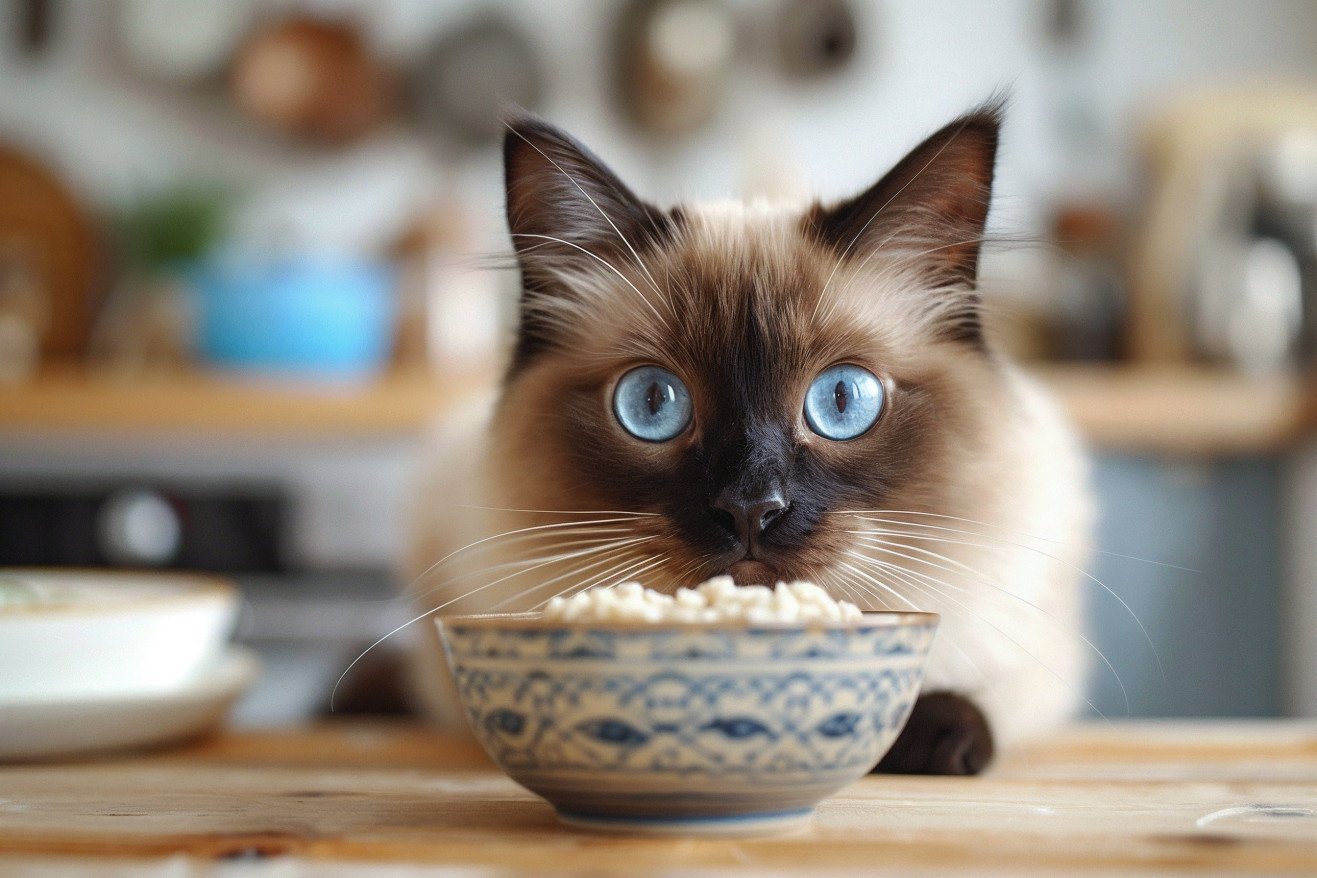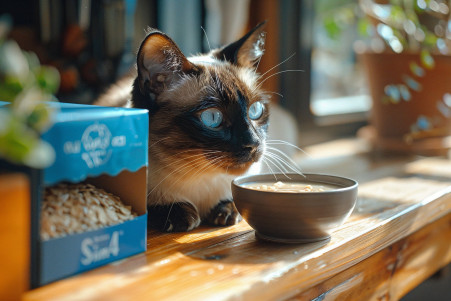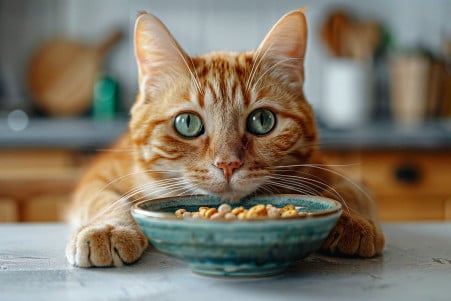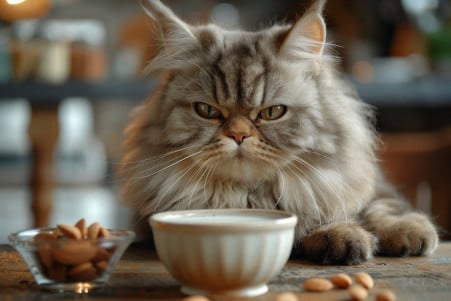Can Cats Eat Oatmeal? Feeding Tips and Nutrition Info
14 February 2024 • Updated 12 February 2024

Oatmeal is a common food in many people’s diets, but whether or not it’s good for cats is a valid question. Cats can eat oatmeal in moderation as an occasional treat. It has some protein and fiber, but it should not be used as a substitute for a meat-based diet. Make sure to only feed your cat plain, cooked oatmeal and never give them milk since cats are lactose intolerant.
This article will look at the details of cat nutrition, using veterinary and nutritional research to discuss the potential pros and cons of feeding cats oatmeal.
It will also consider the biological needs of cats as obligate carnivores and look at where non-meat foods like oatmeal fit into their diet. By looking at the advice of experts and the science of cat nutrition, we hope to help you better understand how to make informed choices about adding new foods to your cat’s diet.
Can cats eat oatmeal?
Nutritional Benefits of Oatmeal for Cats
Oatmeal is a popular human breakfast food that contains a number of nutritional elements that can be good for cats in moderation. Cats.com explains that oatmeal is a good source of protein and fat, including linoleic acid and essential amino acids, which are important for maintaining healthy skin and coat in cats. Oatmeal also contains dietary fiber, which can help prevent constipation and promote healthy digestion.
On the other hand, as PetMD points out, cats are obligate carnivores, which means that they need to get most of their nutrients from animal-based proteins. This includes taurine, an amino acid that is not present in oatmeal but is essential for cats. Although oatmeal contains some vitamins and minerals, it lacks many of the nutrients that cats can only get from meat.
While the protein and fiber in oatmeal can be helpful, oatmeal is not nutritionally complete for cats.
Cats are obligate carnivores, which means that they get most of their energy from protein, not carbohydrates, and too many carbs can lead to health problems like obesity.
As a result, cat owners should not think of oatmeal as a food for cats, although it can be an occasional treat. Cat owners who feed their cats oatmeal in a way that is mindful and intentional make sure that it helps, rather than hinders, the delicate nutritional balance that is necessary for their cats’ health.
Carnivorous Nutritional Needs
Cats are obligate carnivores, which means they need a diet that is primarily made up of meat in order to get the nutrients they need to survive.
This term is based on the fact that cats require specific nutrients that are only found in animal tissue, including essential fatty acids, certain minerals, and vitamins such as calcium, vitamin A, and niacin, according to VCA Animal Hospitals.
Cats have a digestive system that is not well-suited to breaking down plant material, so they need a diet that is high in animal proteins in order to get the right balance of amino acids, including taurine—an essential nutrient that cats can’t produce on their own.
Plant-based foods have a number of limitations when it comes to meeting these nutritional needs. While oatmeal and other grains have some nutritional value, they don’t contain the full range of nutrients that cats get from their natural prey.
Diets that are based on plant proteins can’t provide the high levels of dietary protein and fat that cats need, which is why most commercial cat diets are formulated to meet these nutritional needs, according to the Countryside Veterinary Clinic.
Cats’ need for a meat-based diet isn’t just a matter of taste, it’s a matter of health. Making sure your cat gets enough animal protein in their diet is essential to their overall health, energy levels, and even their hydration, since cats get a lot of their water from their food. This is an important thing to keep in mind when thinking about adding non-traditional foods like oatmeal to your cat’s diet.
How to Add Oatmeal to Your Cat’s Diet
If you decide to give your cat oatmeal as an occasional treat, it’s important to do so in a way that is safe and healthy. You should start with a small portion, no more than a tablespoon of cooked oatmeal, and give it to your cat no more than once a week to avoid any digestive issues.
In addition, oatmeal should be cooked in water, not milk, since many cats are lactose intolerant and milk can cause stomach upset.
Make sure that the oatmeal you give your cat is plain and free of any additives like salt, sugar, or flavorings, all of which can be harmful to cats. In addition, the ingredients in many oatmeal products, like chocolate and raisins, are toxic to cats and should be avoided at all costs. Instead, stick to plain oatmeal and watch your cat carefully to see how they react to it.
Keep an eye out for signs of intolerance or allergies, as some cats may have negative reactions to oats. In particular, you should look for signs of skin irritation, vomiting, or diarrhea. If you notice any of these symptoms, stop giving your cat oatmeal and talk to your vet.
As with any change to your cat’s diet, it’s important to proceed with caution and always consult with a vet to make sure you’re doing what’s best for your pet.
Feline Food Sensitivities: Oatmeal
While less common than other allergies, cats can have food allergies that result in adverse reactions to proteins that are typically found in meat. However, as outlined in a piece by Hill’s Pet, cats can also have sensitivities to plant-based ingredients, including those in grains like oatmeal.
While oatmeal isn’t typically listed as a primary allergen in cats, any change in diet can lead to digestive upset or allergic reactions. Cats that exhibit intolerance symptoms, like vomiting, diarrhea, or skin issues, should be seen by a vet right away.
An article by the Cornell University College of Veterinary Medicine explains that cats can have gastrointestinal issues in addition to allergic reactions, and while this isn’t specific to oats, these symptoms should be watched for when a new food is introduced.
Meanwhile, an article by PetMD points out that if cats are scratching or showing signs of distress after eating oatmeal, this could be a sign of a food allergy and should be evaluated by a vet.
For cats with certain health issues, like diabetes or obesity, the high carbohydrate content of oatmeal could be problematic. It’s important to consider the individual cat’s health and nutritional needs and make decisions accordingly. The cat’s diet should be focused on its carnivorous requirements, with the occasional treat like oatmeal being kept to a minimum and always being done under the guidance of a vet.
Why Fiber Is Important for Your Cat
Fiber has several important roles in feline nutrition, including supporting healthy digestion and gut function. Since cats are obligate carnivores, their natural diet is low in fiber. However, Vet Focus notes that fiber can be useful in the management and prevention of hairballs, in weight management, and in the treatment of diabetes by controlling blood sugar levels.
Oatmeal, in particular, is a good source of both soluble and insoluble fiber. According to Nom Nom, soluble fibers dissolve in water to form a gel that can help regulate the digestive system, while insoluble fibers don’t dissolve and instead add bulk to the stool.
Adding oatmeal to a cat’s diet can be good for their digestive system because it provides a source of fiber that’s similar to the roughage that wild cats would get from eating their prey’s feathers and fur.
The Association of American Feed Control Officials recommends a moderate fiber level of about 6% in cat food, and many commercial cat foods fall within this range. While oatmeal can be added to a cat’s diet in a way that’s consistent with these recommendations, PetMD notes that too much fiber can cause digestive problems like constipation and diarrhea.
As with many things, moderation is key when it comes to fiber in your cat’s diet. A little bit of oatmeal can be helpful, but it’s important to make sure you’re not overdoing it in order to avoid digestive issues and ensure your cat’s overall health.
Oatmeal for Cats: The Bottom Line
So, while oatmeal is safe for cats to eat in moderation, it’s also evident from experts like Dr. Joanna Woodnutt and Meowbox that it’s not something that should be a regular part of a cat’s diet.
Cats are obligate carnivores, which means their nutritional needs are best met by eating animal-based proteins. While oatmeal can provide some nutritional benefits like protein and fiber, it doesn’t contain the essential amino acids and micronutrients that cats can only get from meat.
It’s also important to remember that moderation and working with your vet are key when it comes to feeding your cat oatmeal or any other new food. Untamed points out that there are potential dangers, including gastrointestinal upset and allergies, that can come from feeding cats oatmeal in the wrong way.
However, if you’re aware of the balance that needs to be struck in terms of your cat’s nutritional needs and you’re on the lookout for any negative side effects, you can help make sure that your cat stays healthy and happy.
With the help of a vet, you can also make sure that your cat has a varied and enjoyable diet that includes a mix of traditional meat-based foods and occasional non-traditional options like oatmeal. Just make sure that you always prioritize your cat’s carnivorous nature when you’re making dietary decisions for them so that you can be sure that you’re doing what’s best for their health.


